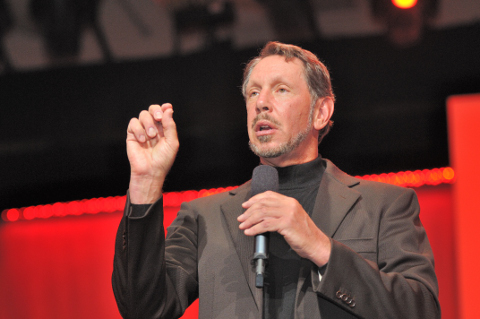

Photo from Oracle Corporate Communications
"IF an open source product gets good enough, we'll simply take it," said Oracle's CEO on one occasion. Steven J. Vaughan-Nichols (SJVN) has found another memorable quote that he mentions in relation to this article:
So why would Oracle, a Linux-supporter in its own right, introduce the evil of software patents into open-source programming? My answer: Because Larry Ellison, Oracle's CEO, thinks the company can profit from it.
You see there are two ways of looking at open source, as Eben Moglen, founder of the SFLC (Software Freedom Law Center), explained recently at LinuxCon. Moglen said, "The patent crisis is not going to go away. We're now in a situation -- after the Bilski decision -- where clarity on the patent situation is not coming anytime soon." And, "The patent system is built for secrecy and for trouble-making -- it's not a pro-innovation system."
Because of this, Oracle decided to make hay while they could with its aging Sun Java patents. But, why did they choose this way? Well, Moglen answered that question as well even before anyone knew that Oracle was going to sue anyone.
Sun engineers once ran an unofficial competition to see who could get the "goofiest" invention past the US patent office, according to former Sun man and Java founder James Gosling.
In suing Google over its use of Java on Android, Oracle is waving seven Sun patents, and one of them carries Gosling's name. In a blog post sparked by the suit, Gosling says Sun didn't pay patents much heed until the company was successfully sued by IBM for infringing on its so-called RISC patent. Then Sun went on a "patent binge", and yes, this included some less-than-serious filings.
Comments
twitter
2010-08-20 03:19:13
Maxsyma was a symbolic algebra code developed at public expense then handed over to several companies that were to "commercialize" it. Most of the original companies failed but the survivors built Mathmatica and Maple. Everyone else was locked out of what should have been public property. The US DOE finally allowed a University of Texas professor to distribute a copy he saved for decades and the free software world once again has Maxima.
Spyglass was a private Mosaic derivative that Microsoft stole to build Internet Explorer. While at least one person claims that no NCSA code was used in Spyglass, it is clear that what should have been public domain code was "licensed" out exclusively to a bunch of thieves who cheated each other and the public.
The software patent fraud is not very different from the original drive to "commercialize" public domain software. Both are based on a false arguments that enrich a few at the expense of the many. Software patent proponents claim that exclusivity will drive competition and innovation the same way the commercializers did. 30 years ago, that argument might have seemed plausible but today it is bankrupt. Free software has been incredibly innovative and nearly impossible to beat with little help from governments or private companies - the commons has worked and exclusivity is its enemy. Non free software is stale and uncompetitive by comparison. We should not fall for the same trick twice.